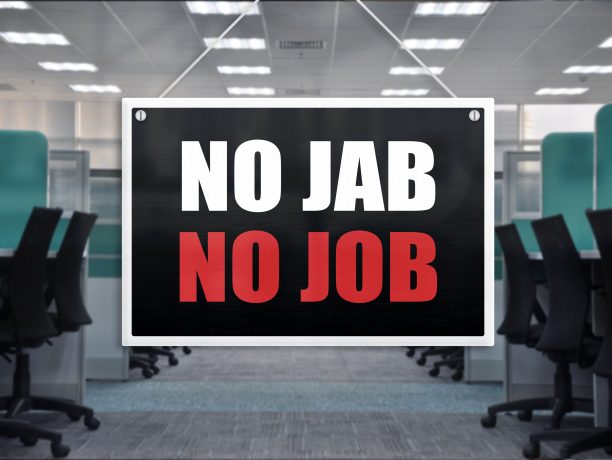Last week, the UK witnessed a historic landmark in the pandemic milestone calendar. Monday 19th July marked ‘Freedom Day’ as England welcomed the end of most lockdown restrictions across the country.
Since the rollout of the Covid-19 vaccination programme, which began in December, just over 46 million people in the UK have now received at least one dose of a vaccine, with 82 million total vaccinations administered. However, there are still countless people across the country who have not yet taken up the offer of the vaccine, despite being eligible to receive it. We also know that vaccinations are not 100% effective at preventing hospitalisations and deaths or infection.
Joseph Lappin, Head of Employment at Stewarts, provides expert insight on the potential ‘no jab, no return’ policy, managing working lifestyles in a post-pandemic world, and what employees and employers alike should be aware of from a legal standpoint.
‘Freedom Day’
Since 19 July it has been up to employers to decide, without instruction from government, where their staff should be plying their trades. The minority of employers who wish to compel their workers to return will need to consider several issues.
Although the instruction to work from home has been dropped, the government has issued guidance for employers on the return to work. This suggests that employers should ask staff who have been working from home to return to the office gradually.
Employers still have a legal duty to protect the health and safety of their staff. In the context of Covid-19, employers must identify the risks posed by the virus in the workplace. This isn’t a simple box-ticking exercise. Employers must carry out a detailed risk assessment, identify the real risks posed by the virus and implement safety measures to protect their staff. The measures employers will need to introduce will depend on the workplace. Safety measures on a building site will differ to those in an office in a city centre. Government guidance includes a range of measures employers should be implementing, including ensuring that workplaces are cleaned regularly and that adequate ventilation systems are in place.
It is crucial that employers make their workplaces safe. Employees who reasonably believe their workplaces pose a real and imminent risk to their safety have protection under employment laws – employees must not be subjected to a detriment or be dismissed if they refuse to attend the workplace citing genuine safety concerns.
As vaccination numbers increase, and if employers have invested time, money and effort in making their workplaces Covid secure in line with government guidance, these arguments may become harder to sustain but every complaint will turn on its own facts.
Incentivising staff
Many employees who have been working from home since the start of the pandemic will be reluctant to return to the workplace. Many will ask whether it is truly necessary to return to the “old normal” and return to offices at all.
Employers who want staff to return to the office will need to sensibly identify ways to encourage and incentivise their employees to come back to work. This could be implemented in several ways, such as:
• Assigning mentors to staff to help staff deal with and overcome legitimate worry and anxiety associated with a return to work
• Offering bike-to-work schemes so that staff do not need to use public transport
• Providing activities for staff at work, for example yoga or keep fit classes
• Investing in, improving and upgrading work spaces
Return stand-off
Some employers might insist that – whether the employee agrees or not – their presence in the office is a necessary term of the employment contract, and failure to return could lead to disciplinary action or even dismissal. However, our view is that employers should do all they can to try to avoid such disagreements arising. These are unique times, and most concerns will be genuine. Sensible employers will consult with their staff, try to understand the reasons for staff not wanting to return to work and will work with staff to find solutions.
Vaccinations
Different businesses will adopt varying approaches to a “no jab no return” policy. For example, those operating in the hospitality or the healthcare sector will likely hold different views on the no jab, no job policy compared to employers operating in professional and financial services. Staff working in care homes will be required to be vaccinated.
Can my employer make me get a Covid-19 vaccine before coming to work?
The short answer is yes. Obviously, an employer cannot compel staff to be vaccinated if they do not wish to be. However, employers might be able to insist that staff cannot return to the workplace unless and until they have been fully vaccinated.
Employers who implement a no jab, no job policy will need to grapple with a number of tricky legal and non-legal issues. Staff may refuse a vaccine for several reasons, including on grounds of health, philosophical belief or religion. Will such a policy be discriminatory?
What will be the impact on staff morale? How will this data be recorded and used by employers? Can less onerous policies be implemented, for example, by requiring staff to undertake regular testing? Could employees who refuse the jab continue to work from home for an extended period? Could an employee who refuses the jab have their duties amended temporarily to avoid them coming into contact with others?
Employers will adopt different arrangements when it comes to vaccination. Before taking the arbitrary decision to prohibit employees who have not had a jab from returning to work, sensible employers will engage with staff and listen to their reasons for them refusing the vaccine.
This article was written by Joseph Lappin, head of employment at Stewarts, the UK’s leading litigation-only law firm.











